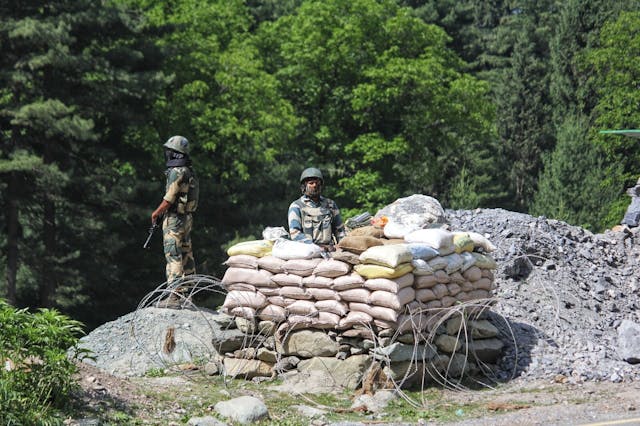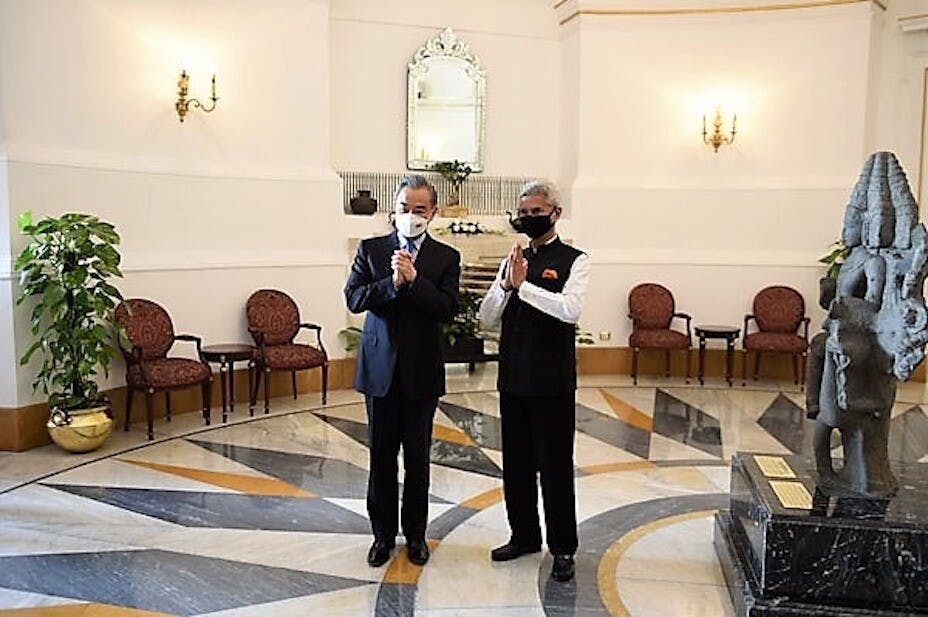中國外交部長王毅對印度進行為期兩天的訪問,與印度外長蘇傑生就實現和平與進步的必要性達成了重要共識。儘管中印傳媒對雙方討論的報道存在較大分歧,但雙方達成的共識,可視為繼2020年4月至6月邊境軍事對峙後,中印關係的轉捩點。
中國官方新華社的報道強調,王毅表示:「雙方應加強溝通、協調立場,維護各自正當利益和發展中國家共同利益,為促進世界和地區和平穩定作出各自貢獻。」
中印在不結盟運動有共同點
王毅試圖提醒印度,兩國在不結盟外交政策上的共同點──這是中印關係在1955年萬隆會議上的一個高峰,當時中國總理周恩來不僅以嫻熟而溫和的方式來與印度總理尼赫魯會談,而且提出了「互相尊重主權和領土完整、互不侵犯、互不干涉內政、平等互利、和平共處」的五項原則。
儘管王毅和蘇傑生的會談,沒有重申和平共處五項原則,但中印兩國一直在採取相對中立的態度來處理俄烏衝突──這是他們討論的話題之一。然而,在意識形態和軍事上,印度近年來稍向西方傾斜,主要是因為新德里對所謂「中國威脅」的看法。
最近重新活躍的「四方安全對話」或 Quad,顯示了印度如何看待中國並在安全方面與澳洲、日本和美國結盟。資本主義民主國家意識形態上的親緣關係,也使澳洲、印度、日本和美國更密切、更容易加強安全合作。然而,印度對烏克蘭的立場,已經引起了「四方安全對話」其他成員的注意,尤其是美國總統拜登,他最近評論說,印度對烏克蘭局勢的立場「不堅定」。
兩國對烏克蘭問題有共識
最有趣的是,印度外交部長蘇傑生出席記者會時,確實談到了印度和中國的共同點。 蘇傑生提到了印度和中國關係發展的三個決定因素,即「相互尊重、相互理解、共同利益」。 因此,這些新原則已成為印度和中國外長會談的主要突破和共識之一。
這位印度外長還承認,印中雙方在烏克蘭問題都同意,應「立即停火、並回到外交途徑和對話」。 或許俄烏衝突意想不到的後果是,它為印度和中國提供了一個絕佳的機會,來反思並提出共同應對國際衝突的方法。
中印邊界爭端須「武力降級」
新華社關於王毅訪印度的報道,與印媒向蘇傑生提問的一個顯著區別在於,雖然中國官方媒體強調印方「願同中方加強溝通、增進互信,使雙邊關係儘早走出低谷」,但印度記者對中國如何處理與印度的邊界爭議更感興趣──這是蘇傑生在記者會上發表的聲明中最重要的話題。
印度外長在記者會及回答記者提問時,兩次重申兩軍「脫離接觸」和「武力降級」兩個詞,表明印度的立場,即中國軍隊在中印邊境的「大規模部署」仍然是「異常」的情況,必須糾正。然而,令人鼓舞的是,蘇傑生承認,雙方高級指揮官之間的第 15 輪會談取得了進展,儘管這種進展「緩慢」。新華社還報道了蘇傑生關於邊界談判取得進展的言論,這一現象表明中方重視旨在解決邊界爭端的談判進展。
王毅籲以長遠眼光看雙邊關係
新華社的另一篇報道,重點介紹了王毅訪印度取得的積極成果。3月25日,新華社報道指出,王毅在會見印度國家安全顧問多瓦爾時提出三點思路:
一是要以「長遠眼光」看待雙方關係;二是中印雙方都要以「共贏思維看待彼此發展」;。三是「要以合作姿態參與多邊進程」。
顯然,中國官方傳媒在談及中印雙邊關係時,採取了與王毅一致的立場。3月26日,香港無綫電視新聞報道,王毅表示,兩國邊界問題「不應影響雙邊關係」,中印要將邊界問題「置於雙邊關係適當位置」。換言之,中方希望在雙邊關係取得進展的更廣泛框架內解決邊界爭端,這一建議仍有待印方消化和接受。
這種在雙邊關係取得進展的更廣泛框架內解決邊界問題的做法,可以從王毅與蘇傑生長達3小時的會談話中可以看出。在新德里舉行的記者會上,這位印度外長透露,他「十分關切印度在華留學生因新冠疫情的關係而無法回國的困境」。他透露,王毅答應與中國有關當局商討。
印度反對克什米爾公投自決
這位印度外長還透露,他對王毅出席在巴基斯坦舉行的伊斯蘭合作組織(OIC)會議時發表的言論,表達印方的「反對」。據印度傳媒報道,王毅提到中國與伊斯蘭會議組織在克什米爾問題上,擁有共同的願望。據了解,伊斯蘭會議組織支持巴基斯坦在克什米爾問題上的立場,尋求在該地區舉行全民投票來決定其未來。
對此,印度外交部發言人巴奇正式表示,有關克什米爾的事情完全是印度的內政。事實上,近期有印度傳媒評論員呼籲中方,雖然印方不評論和干涉中國內政,但中方也應該採取同樣的做法。如果是這樣,當蘇傑生公開談到需要採取三個原則──即相互尊重、相互理解、共同利益時,「相互理解」可以解釋為對中方的溫和提醒。不過,鑑於中國與巴基斯坦的友好關係,王毅在伊斯蘭會議組織會議上的表態或許是可以理解的。
中印可在俄烏衝突中締造和平
分析來看,王毅此次訪印主要有兩個積極進展。雙方確認不僅在兩國邊界實現和平,而且在世界範圍內實現和平的重要性。雙方一致認為,應在影響雙邊關係的問題上取得進展,從讓在華印度學生回國的便利性,到在兩國邊界沿線所需的兩軍「脫離接觸」和「武力降級」,應有盡有。

從不同立場達成共識的角度看,王毅此次訪印可以說是中印關係的一次突破。在俄烏衝突增加世界新冷戰可能性的關鍵時刻,王毅訪問新德里,對中印相互了解具有重要政治意義。如果中印雙方都對俄烏衝突採取相對中立的態度,如果兩國都是俄羅斯的朋友,那麼中印扮演和平締造者和中間人的角色是潛力巨大的。
印中應為和平共處友好鄰邦
在國際衝突中保持中立是很難實現的,但如果印度掌權的精英回憶起1950年代中期印度領導的不結盟運動的鼎盛時期,或許新德里當局可能會反思是否應該更多地視中國為一個與印度有着悠久和平共處歷史的友好鄰國,而不是「威脅」。
總而言之,王毅此次訪印是2020年中以來中印關係發展的一次突破。讓地區和世界和平、中印雙邊關係不斷取得進展,是他開創性訪問達成的重要共識。邊界爭端顯然仍是印方的眼中的一根刺,但在兩國外長都表達了明確的政治意願的情況下,希望中印兩軍繼續「脫離接觸」和「武力降級」,從而在未來幾年的雙邊關係中實現雙贏。對於中印兩國的挑戰,在於雙方能否並且將巧妙地將邊界爭端,與雙邊關係中的其他實際問題分開處理。
Consensus on Peace and Progress: Wang Yi’s Visit to India
The two-day visit of the Chinese Foreign Minister Wang Yi to India has reached a signficant consensus on the necessity of achieving peace and progress with the Indian External Affairs Minister Subrahmanyam Jaishankar. Although reports on their discussions differed significantly between the mainland Chinese side and the Indian media, their consensus can be regarded as a turning point in the relations between China and India after the military standoff along their border from April to June 2020.
The report in Xinhua emphasized that, according to Wang Yi, “the two countries should strengthen communication and coordinate their stances in safeguarding their legitimate interests as well as the common interests of the developing countries, so as to make respective contributions to peace and stability in the region and the world.”
Wang tried to remind India of the commonality between the two countries in their non-alignment foreign policy – an apex of Sino-Indian relations in the Bandung conference in 1955 when the Chinese Premier Zhou Enlai not only adopted a skillful and moderate approach to dealing with the Indian Prime Minister Jawaharlal Nehru, but also came up with the five principles of “mutual respect for other nations, territorial integrity and sovereignty, nonaggression, non-interference in internal affairs, equality and mutual benefit, and peaceful coexistence.”
Although the Wang-Jaishankar meeting did not reiterate these five principles of peaceful coexistence, both China and India have been adopting a relatively neutral approach to dealing with the Russian-Ukrainian conflicts – one of the topics in their discussion. Ideologically and militarily, however, India has slightly moved closer toward the Western alliance in the recent years, mainly because of its perception of the “China threat.” The recent reinvigoration of the Quadrilateral Security Dialogue or QUAD has shown how India has been viewing China and allying with Australia, Japan and the United States in the security dimension. The ideological affinity of capitalist democracies has also made Australia, India, Japan and the United States much closer and easier to enhance their security cooperation. Yet, the Indian position on Ukraine has already raised the eyebrows of other QUAD members, especially US President Biden who has recently commented that the Indian position on Ukraine is “shaky.”
Most interestingly, when the Indian External Affairs Minister Subrahmanyam Jaishankar attended the press conference, he did talk about the commonalities between India and China. Jaishankar referred to three principles adopted by both India and China in international relations, namely “mutual respect, mutual sensitivity and mutual interest.” As such, these new principles have stood out as one of the main breakthroughs and common understandings between the Indian and Chinese foreign ministers. The Indian foreign minister also admitted that India and China had “common elements” in the Ukrainian issue, namely “immediate ceasefire, diplomacy and dialogue.” Perhaps the unintended consequence of the Russian-Ukrainian conflict was that it has provided a golden opportunity for India and China to reflect on and come up with their common approaches to coping with international conflicts.
A striking difference between the Xinhua report of Wang Yi’s visit and the Indian media’s questions directed at Jaishankar was that while the official Chinese media stresses India’s willingness “to strengthen communication with China and increase mutual trust to get their relationship out of its current low as early as possible,” the Indian reporters were far more interested in how China deals with the border dispute with India – a topic that was featured as the most important one in Jaishankar’s statement in his press conference. The Indian external affairs minister reiterated the words “disengagement” and “de-escalation” twice in his press conference and his response to reporters’ questions, showing India’s position that “a large deployment” of Chinese military along the border with India remains an “abnormal” situation that has to be rectified. Encouragingly, however, Jaishankar admitted that the 15throunds of talks between the senior commanders from both sides made progress, albeit such progress was “slow.” The remarks of Jaishankar on the progress made in the border talks were also reported in Xinhua – a phenomenon showing that the Chinese side attaches importance to progress in talks that aim at resolving the border dispute.
Another report from Xinhua focuses on the positive outcome in the Wang visit. On March 25, the Xinhua report pointed to the three-point approach adopted by Wang Yi tin his meeting with the Indian National Security Advisor Ajit Doval. First, both sides should see bilateral relations with “a long-term vision.” Second, both China and India should “see each other’s development with a win-win mentality.” Third, “both countries should take part in the multilateral process with a cooperative posture.” Clearly, the official Chinese media adopts a positivist approach, as with Wang Yi, in dealing with the China-India bilateral relations. On March 26, the Hong Kong TVB news stresses that Wang Yi’s said the border issue “should not affect bilateral relations” between China and India, and that it should be “put in a suitable position.” In other words, the Chinese side wishes to compartmentalize the border dispute within the border framework of making progress in bilateral relations – an approach that remains to be digested and accepted by the Indian side.
This compartmentalization of the border issue within the broader framework of making progress in bilateral relations could be seen in the three-hour talk between Wang and Jaishankar. In the press conference in New Delhi, the Indian external affairs minister revealed that he “took up strongly the predicament of Indian students who cannot return to India due to the Covid-19 restrictions” in China. He revealed that Wang Yi promised to talk to local authorities in China.
The Indian external affairs minister also unveiled that he expressed the Indian “objection” to a remark made by Wang Yi during the latter’s attendance in the Organization of Islamic Cooperation (OIC) meeting in Pakistan. The Indian media reported that Wang Yi had mentioned that China shares the same hope as the OIC on Kashmir. The OIC is reportedly supportive of Pakistan’s stand on Kashmir, seeking a plebiscite in the region to decide its future. In response, the Indian External Affairs Ministry spokesperson Arindam Bagchi remarked formally that matters relating to Kashmir were entirely India’s internal affairs. In fact, some Indian media commentators have recently reminded China that while India did not comment on and interfere with China’s internal affairs, the same approach should be adopted by China. If so, when Jaishankar openly talked about the need to adopt three principles – mutual respect, mutual sensitivity and mutual interest – the point on sensitivity could be interpreted as a gentle reminder to the Chinese side. However, given China’s friendly relations with Pakistan, Wang Yi’s remark in the OIC meeting was perhaps understandable.
Analytically, there are two main positive developments in the Wang Yi visit to India. Both sides affirm the importance of achieving peace not only along the border of the two countries but also in the world. Both sides agree that progress should be made in the issues affecting their bilateral relations, ranging from the ease in which Indian students in China can return home to the “disengagement” and “de-escalation” that are needed along the border of the two Asian giants. From the perspective of reaching consensus amid different positions, Wang Yi’s visit to India can be regarded as a breakthrough in the Sino-Indian relations. At a critical juncture when the Russian-Ukrainian conflict is enhancing the possibility of an emerging new Cold War in the world, the mutual understandings between China and India during Wang Yi’s visit to New Delhi are politically significant. If both China and India adopt a relatively neutral attitude toward the Russian-Ukrainian conflict, and if both countries are the friends of Russia, they have tremendous potential to play the role of peacemakers and middlemen.
Neutrality in international conflicts is difficult to achieve, but if the Indian power elites recall the heydays of non-alignment movement in the mid-1950s during which India was a leader, perhaps the Indian power elites may rethink on whether China should be constantly seen more as a “threat” than as basically a friendly neighbor with a very long history of peaceful coexistence with India.
In conclusion, Wang Yi’s visit to India is a breakthrough in the development of the Sino-Indian relations since mid-2020. Regional and world peace and continuous progress in bilateral relations are the major consensus reached in his path-breaking visit. The border dispute clearly remains a thorn on the Indian side, but with the clear political will expressed from both foreign ministers, it is hoped that disengagement and de-escalation will continue in such a way that China and India will achieve “win-win situation” in their bilateral relations in the coming years. The challenge is whether both sides can and will skillfully handle their border dispute in a compartmentalized manner separate from other practical issues in bilateral relations.
原刊於澳門新聞通訊社(MNA)網站,本社獲作者授權轉載。


































